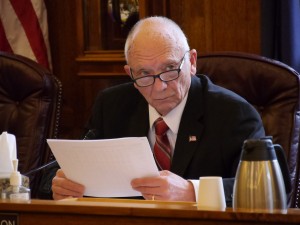With just over a week left in the legislative session, lawmakers are still wrangling over the always-contentious issue of oil taxes.
Gov. Bill Walker has requested a complete overhaul of the state’s oil and gas tax credit program. The House Resources committee scaled back that proposal.
Now, a third committee has weighed in. The House Finance committee chose a middle route — while also introducing some changes that weren’t even in the governor’s bill.
APRN’s Rachel Waldholz has been following the debate.

TOWNSEND: Rachel, where do we stand right now?
WALDHOLZ: The numbers are kind of squishy, but if you look out at fiscal year 2018, the governor’s plan would raise or save more than $400 million. House Resources, which was the first committee to weigh in, their plan would have saved less than $100 million. House Finance’s plan saves in the $100 million to $200 million range. So it’s in between, but it’s nowhere near what the Governor is asking for.
TOWNSEND: What’s new in this bill?
WALDHOLZ: Well, the Governor’s bill would have repealed some credits and it would have raised the minimum tax on the North Slope. House Finance has moved beyond scaling back credits, it’s now tinkering with some of the core structure of the existing tax system.
For instance, the House Finance bill would sunset incentives on new oil. So this is a key part of our current tax structure, lower taxes on new oil, and the House Finance bill would say, look, after five years it’s no longer new oil, it goes back to being charged the same amount as legacy fields like Prudhoe Bay and Kuparuk.
TOWNSEND: Oil taxes are complicated and even a lot of lawmakers don’t totally understand them. What’s the big picture?
WALDHOLZ: One big philosophical question really is: Do you think the state is getting its money’s worth from these credits?
The Governor and his administration would argue no, especially at low prices, we’re paying too much money. We don’t need to pay 65% of the cost of a well to make it attractive.
And some of these credits, like the ones in Cook Inlet, were designed in response to very specific crises that have passed. We’re not worried about a natural gas shortage, so it’s okay to scale back those credits, they would say, without a huge impact on the state.
But lawmakers say, look, these credits are an investment in more oil. And if you scale it back, you might have less exploration and development, and then less oil 10 or 20 years down the line. So they want to be much more cautious about it.
TOWNSEND: So, what’s next in the process?
WALDHOLZ: You can think of the bill as being in stop two of six in the legislature. It’s gone to House Resources, right now it’s in House Finance, then it goes to the House Floor, Senate Resources, Senate Finance and Senate Floor. If the two bills are different, it goes to the Conference Committee and then to the Governor.
So at this point, all that we really know is that the bill is certain to change.
Lori Townsend is the chief editor, senior vice president of journalism and senior host for Alaska Public Media. You can send her news tips and program ideas for Talk of Alaska and Alaska Insight at ltownsend@alaskapublic.org or call 907-550-8452. Read more about Lori here.
Rachel Waldholz covers energy and the environment for Alaska's Energy Desk, a collaboration between Alaska Public Media, KTOO in Juneau and KUCB in Unalaska. Before coming to Anchorage, she spent two years reporting for Raven Radio in Sitka. Rachel studied documentary production at the UC Berkeley Graduate School of Journalism, and her short film, A Confused War won several awards. Her work has appeared on Morning Edition, All Things Considered, and Marketplace, among other outlets.
rwaldholz (at) alaskapublic (dot) org | 907.550.8432 | About Rachel





